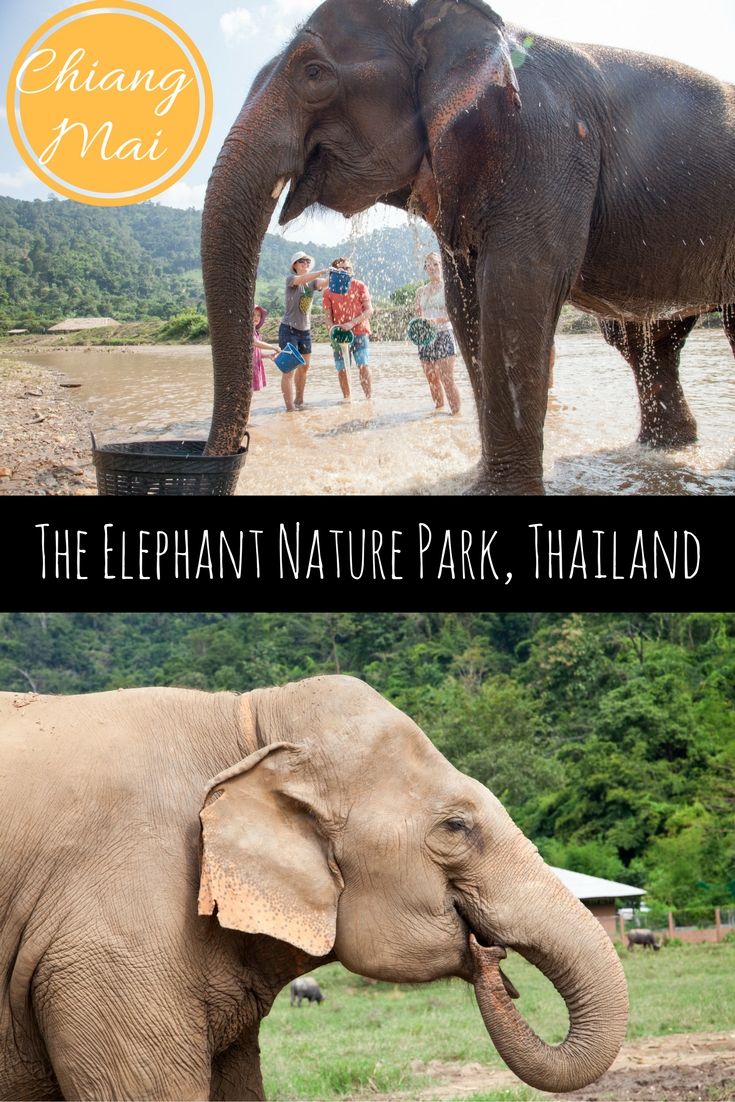
Our time at the Elephant Nature Park in Thailand was life changing. We are a family of animal lovers and visiting these elephants in Chiang Mai has been at the top of our travel list for a good 10 years. To finally see the elephants in person and learn about these magnificent creatures was an experience that none of us will ever forget.
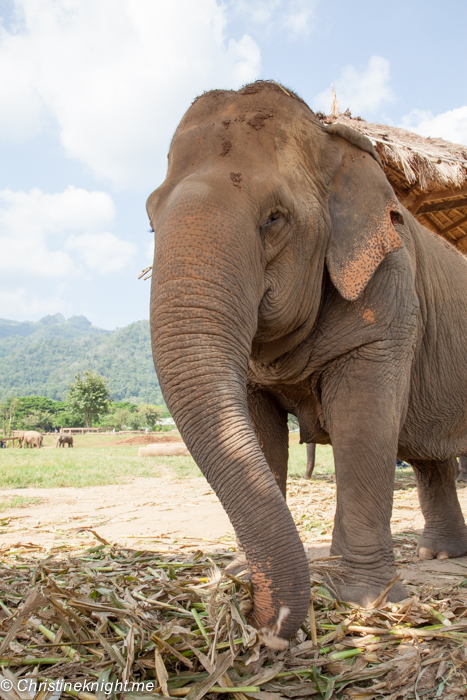
The Elephant Nature Park was established in the 1990s by Sangduen “Lek” (Thai for “Shorty”) Chailertas, a sanctuary and rescue centre for elephants. The park is located some 60km from Chiang Mai city, and has provided a sanctuary for rescued elephants from all over Thailand. There are currently around 75 elephants that call the park home, the majority of whom have been rescued, with a few born into the park. The youngest elephant at the park when we visited was five months old.

In more recent years, the park operators, in conjunction with the Save the Elephant Foundation, have also opened the Erawan Elephant Retirement Park in southwestern Thailand and branch elephant parks in Suri and in Cambodia to enable them to expand their rescue operations.
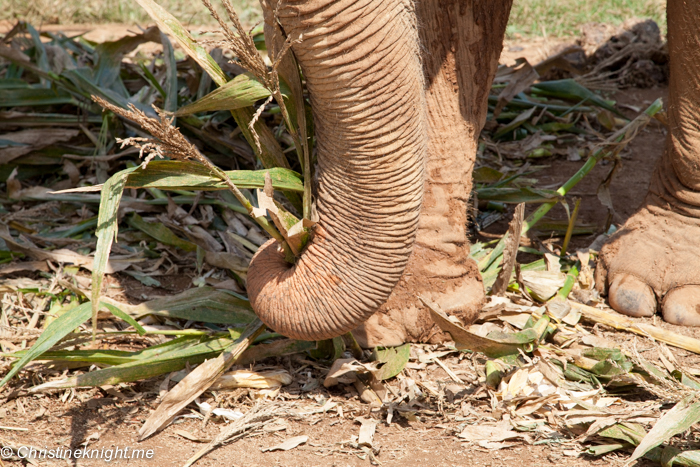
As the park receives no government funding, it operates under a business model in which tourists pay to visit and help care for the animals, with an option to stay for extended periods as a volunteer.
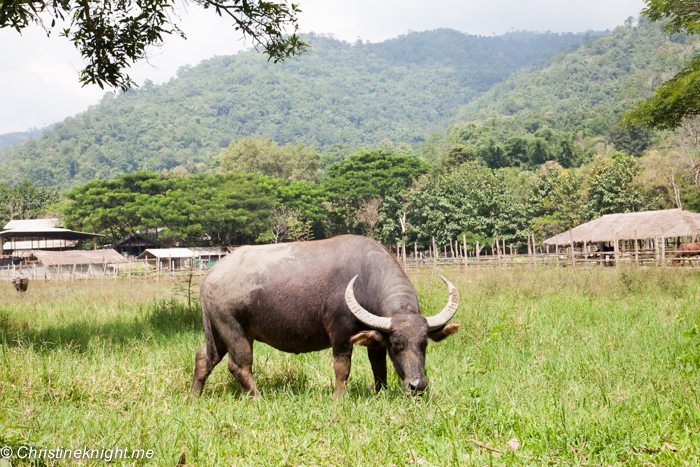
While the park initially opened to rescue and care for elephants, their mission has expanded to care for any animal in need of sanctuary. Animals at the park now include over 400 dogs (many of whom were rescued from a typhoon in Bangkok), a large herd of water buffalo that started as 7 and multiplied to 80, monkeys, cats and a pig.
The park has created its own ecosystem where any scraps go to feed the water buffalo and pig. What the park doesn’t grow itself is bought from local farmers to provide them an income, and the manure from the animals is turn given back to the farmers to fertilise their crops.
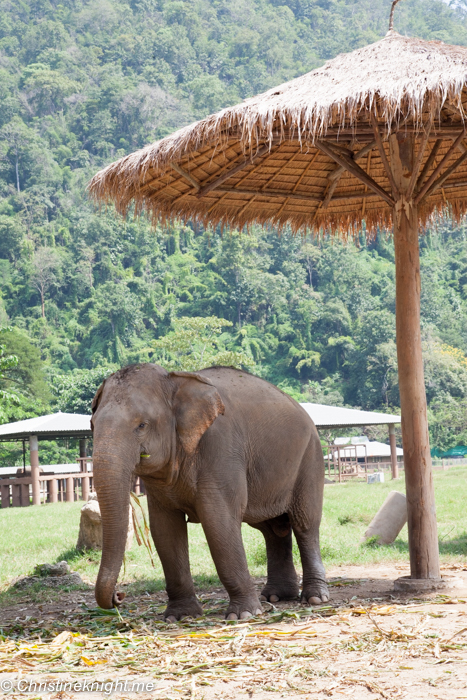
We chose to stay overnight at the park for the most in depth experience possible while visiting with our child. There is no age restriction on visitors to the park, but I wouldn’t recommend bringing small children who are unable to follow instructions. The park belongs to the elephants and humans are just visitors walking among them, keeping out of their way.
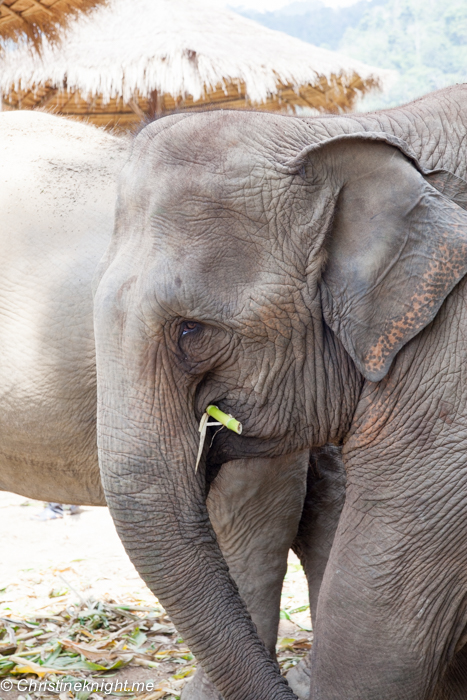
As the park is some ways out of Chiang Mai, we stayed the night before at the Shangri La, and were picked up early in the morning by our tour guide, Deng. He is one of many locals who have been employed by the park to teach visitors about the plight of the endangered elephants.

The drive takes about an hour in a very comfortable minivan, and our education starts here. We watch a video that teaches us about a cruel process called “Phajaan” where elephants are “broken in”, which literally involves crushing their spirit and often breaking their bodies in the process.
The video explains that elephants are taken from their mothers as babies or bred in forced breeding centres and then put through this barbaric process in order to make them compliment and easily trained for circuses, logging, which, despite being banned is still used in remote areas, and the popular animal trekking.
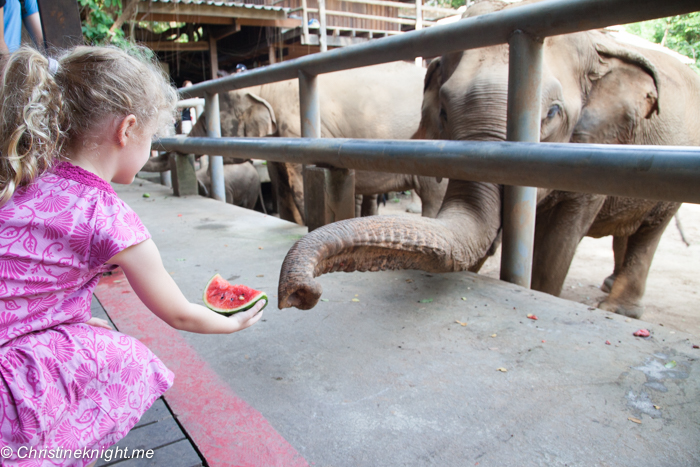
Once at the park we meet the elephants. Up high on a viewing platform we feed them fruit directly into their trunks, which they throw into their mouths like candy. Elephants are herbivores that spend around 12-18 hours a day feeding, so a lot of our interaction with them involves food.
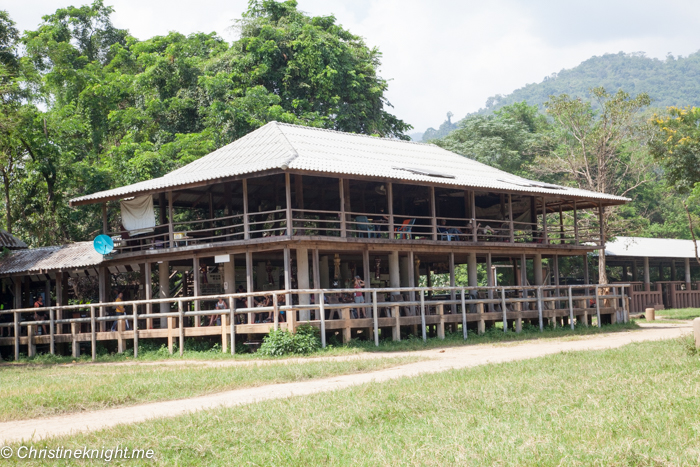
There are strict rules at the park which visitors must agree to obey to be able to meet the elephants – both for their protection and for ours.There is no touching elephants unless you are feeding them at the same time, and no straying off the paths or away from the guides. The welfare of the elephants is at the heart of every rule, but these are also dangerous animals who are roaming freely. No one wants their own story to end getting crushed by an elephant in Thailand.
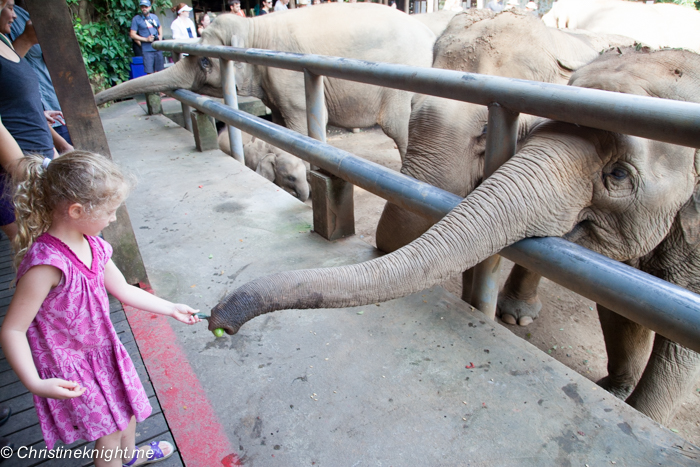
We are taken around the park to meet the elephants up close. Some have formed new herds, some prefer to be on their own. Each elephant is at a different stage of rehabilitation. Some are more comfortable with people, some less so, and we keep well clear of these. When we hear the elephants’ stories we are brought to tears.
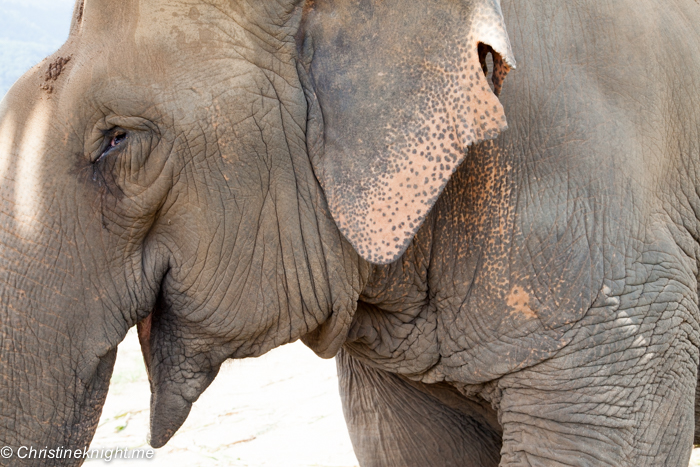
Broken backs through carrying tourists in trekking camps. Blind eyes from tourist camera flashes and gouged by their owners for not obeying orders. Broken legs from treading on landmines while illegally logging. Our hearts break over and over and it’s impossible to hold tears back when we see ripped ears and misshapen limbs on these magnificent animals that deserve so much better.
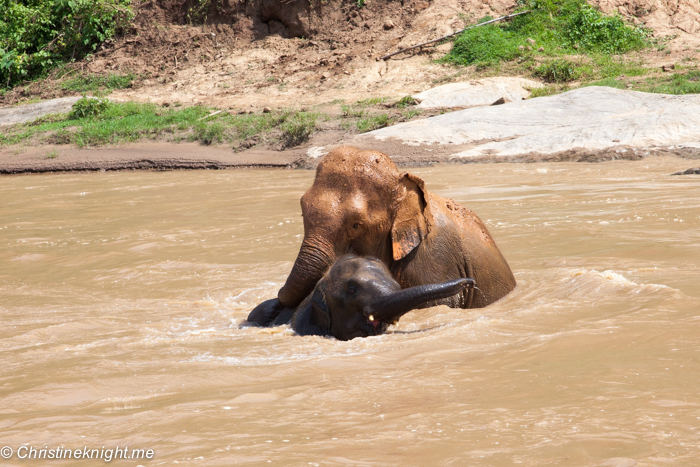
The elephants come to the park bearing a lifetime of scars. Their owners are usually only willing to part with them once they are too old and broken to be of serve any longer, and they want to buy a new elephant to replace it. While the elephants are occasionally given to the park by owners who have genuinely loved them, the majority are purchased, which is where the money visitors pay to visit the park goes to. It did not sit well with any of us that the buying of these elephants actually helps the cycle of elephant abuse continue, but it’s also clear that at the moment that there is no other way to assist the elephants while there is no government legislation to protect them.
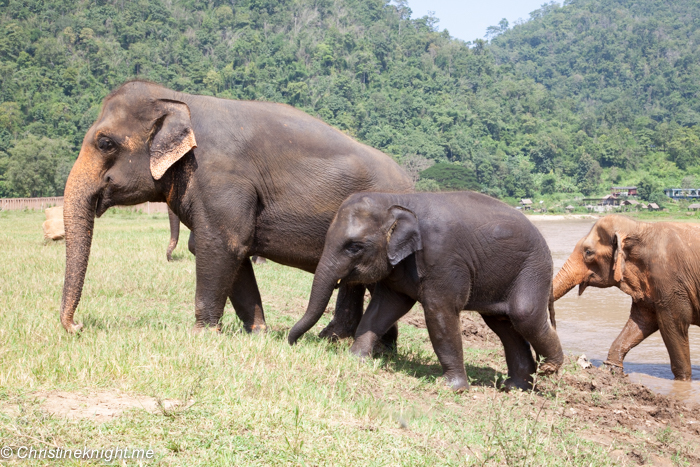
While the stories we hear about the elephants’ history are desperately sad, their future is bright. The park gives them acres to roam in freedom and plenty of nourishing food to eat. There are no more chains, no more heavy loads to carry, just days spend wandering through grassy fields, playing in rivers and taking mud baths.
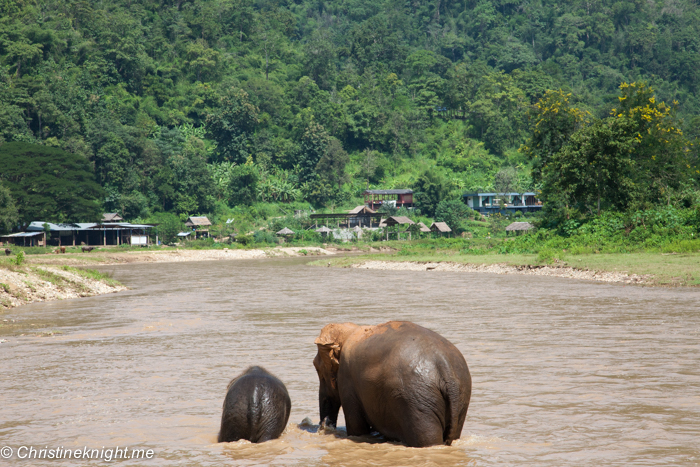
We watch the elephants frolic in the river, playing games and grabbing each other with their trunks. They throw mud on their backs to keep cool and rub up against each other in the shade. The elephants are joyful and playful, newly formed families enjoying their lives once more.

Later in the afternoon we are taken to our room to settle in. It’s much more luxurious than the basic accommodation we had been expecting, and from the balcony we can see the elephants being taken into the large enclosures that they spend the night in, for the protection of both them and the neighbouring villages. We are in awe to be so close – but during the night when they talk amongst themselves instead of sleeping, we are a bit less glad of our close proximity – it’s like sleeping in the jungle!
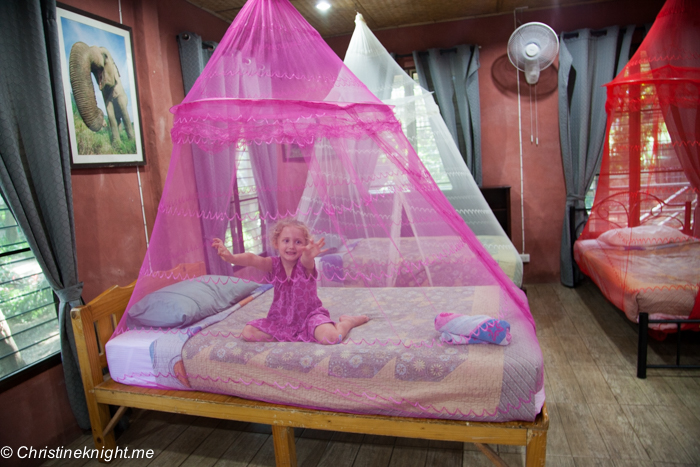
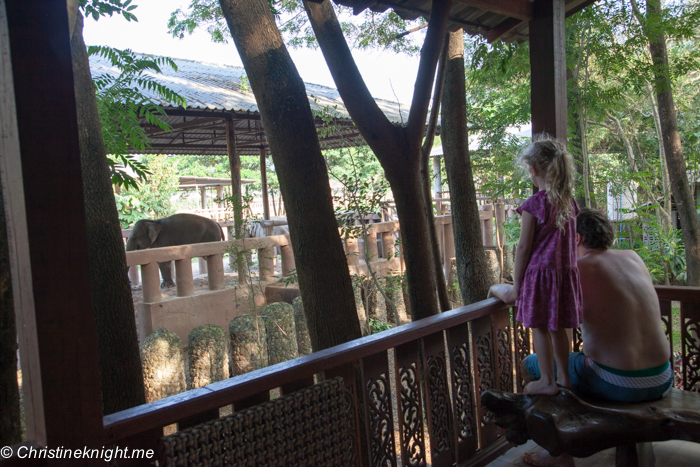
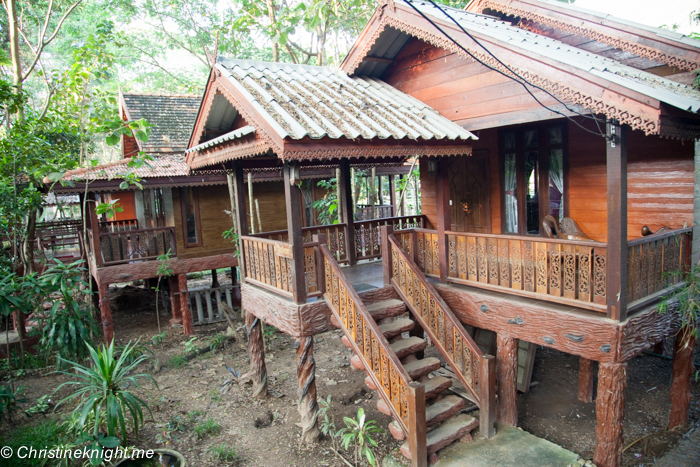
Our second day in the park is much like the first – meeting more elephants, feeding them more fruit, watching them play and making their food. The best moment of each day is washing the elephants in the river to rid them of the fly eggs that stick to their backs and irritate them.
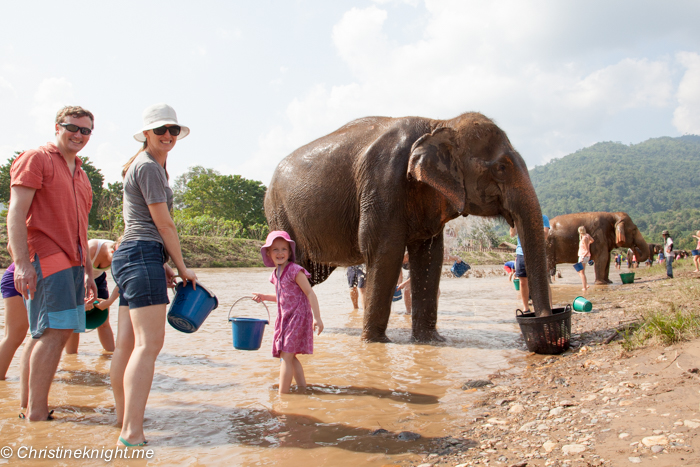
The elephants stand happily in the water munching on fruit while we are armed with small buckets and hurl water at their enormous backs. Elephants can’t smile but I swear there is a grin on the face of our grand old lady as she is cooled down by her willing minions on each side.
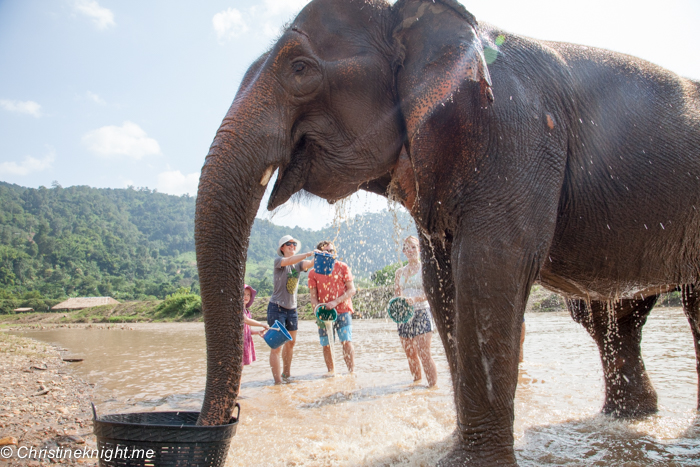
This park is a powerful place to visit, and it’s clear that we are not the only people to have found it to be a profoundly moving experience. It’s not uncommon for volunteers to arrive with the intention to visit for a week and then stay on indefinitely, so moved by their mission and their desire to make a difference in the lives of the elephants and other animals.
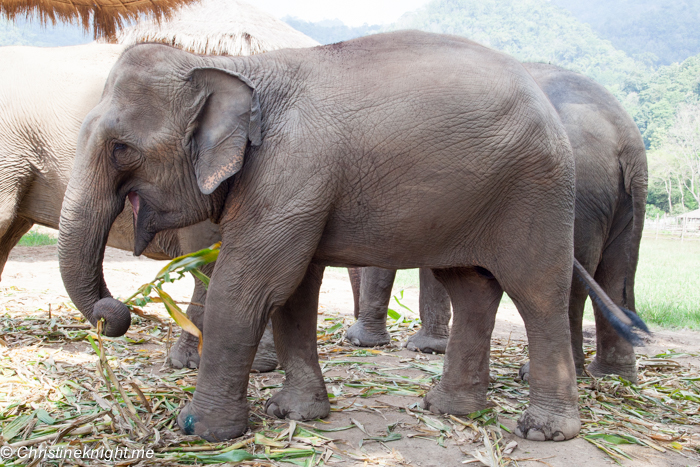
Our stay is only two short days. We are in disbelief when it flies by so quickly and we have to say good bye to the elephants we have fallen in love with. We are told that elephants never forget, and I hope that they can make peace with their devastating past and remember the kindness they have been shown in their new lives by the people who are so passionate about their welfare.
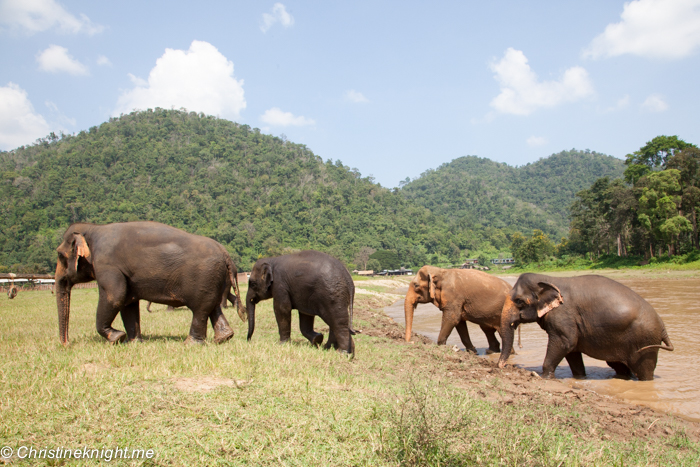
We are all changed by our experience, including five-year-old Cheese. She tells everyone back in Sydney not to ride the elephants “because they’re blind”, which confuses many people about why we took her to see blind elephants, but nevertheless, the message is there and she’s helping spread it.
This is teaching the next generation about conservation at its finest – learning through seeing, doing, hearing, touching. The kind of teaching that encourages children to care through first hand experience, that reaches their hearts and helps them grow up to be passionate advocates for animals and the environment.
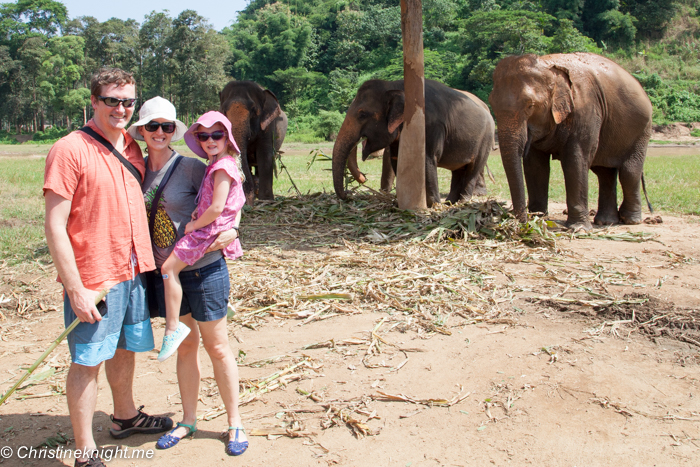
Months afterwards, my daughter is still bringing up moments from our visit. “Do you remember when we fed the elephants?” she asked me on the way to school one morning, out of the blue. “And we washed them in the river?”. She says it in wonderment, like she can’t believe that those amazing experiences in her memory are real. I absolutely do remember. There is no way I will ever forget.
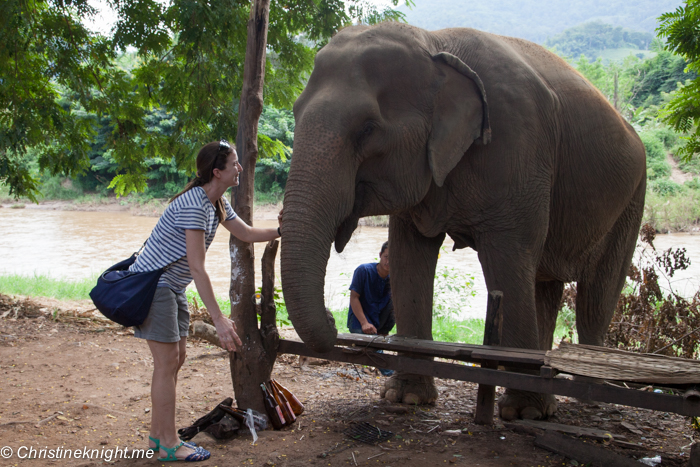
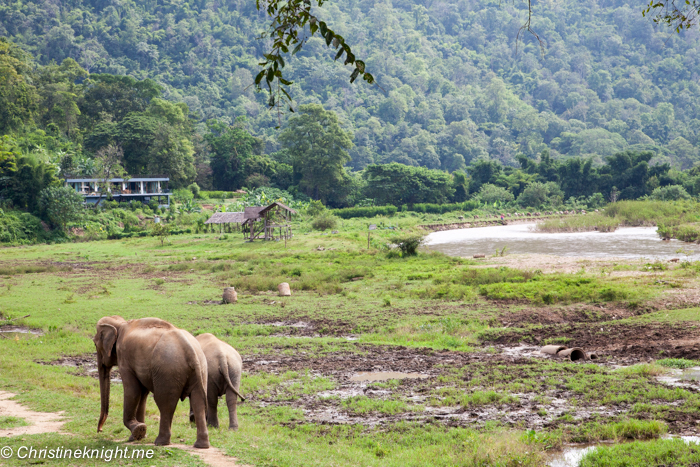
- The only way to visit the park is by booking on a day tour, an overnight tour, or a week long volunteer stay through their website. You cannot turn up on your own without a booking.
- Pack and apply plenty of mosquito repellant.
- Pack shoes for walking through fields as well as going into the water. Shoes like Crocs that are slip on and off and water resistant are ideal.
- Bring Thai or US power adapters.
- There is plenty of water available and you will be given a reusable water bottle.
- The food served is all vegan.
- Book as far in advance as you can as the park is extremely popular and tours book up fast.
- Bring some spare money for buying snacks and souvenirs. We bought some gorgeous wood elephants carved by the mahouts of their charges. We had no problems bringing these back into Australia.
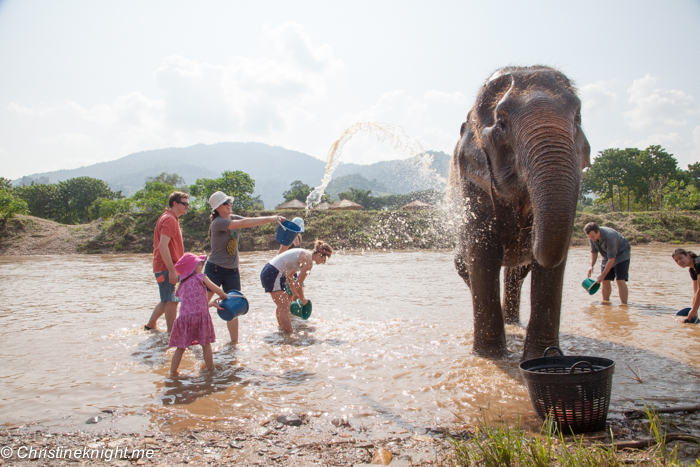
Tips for visiting with kids
- Kids of any age can visit the park for the day or stay overnight. This includes babies.
- Judge wisely whether your kids are the right age and temperament to visit. Are they old enough to follow directions and keep out of harms way?
- Visiting the Elephant Nature Park is only possible through their guided tour programs, which involve a lot of talking and walking. Ensure that kids are able to keep up with the group on foot (we had to carry Cheese a fair bit when her legs got tired) and either listen to the guides or quietly entertain themselves while the guides are talking to the group.
- Dress them to get dirty! Expect to get filthy, sweaty and wet and dress accordingly. Part of the tour involves going into the river knee deep to wash the elephant so bring water shoes, as well as sneakers to walk around the grounds in.
- Pack food they will eat. If you have a fussy eater like ours, bring food they will eat if they turn their noses up at the delicious vegan food on offer. We had some nut bars and the like that kept our fussy five-year-old going.
- For their own safety, ensure that your kids understand the rules of the park regarding behaviour around the elephants. Repeat them frequently with little ones!
- The park is one giant teaching moment for kids, so use the opportunity to talk to them about the situation with elephants in terms they can understand if they’re little like ours. Topics to discuss include not only the issues facing elephants in captivity in Thailand, but the loss of habitat for the Asian elephant and what that means, including their classification as an endangered animal, how elephant families operate and the differences between Asian elephants and African elephants, for example.
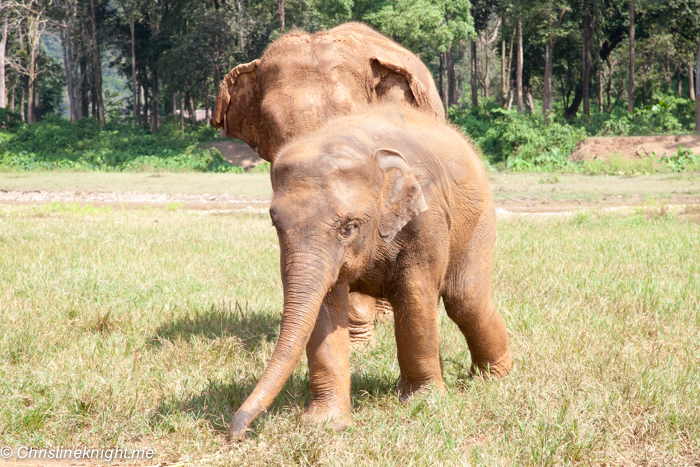
How do you know if a sanctuary is legit?
It can be really hard to tell as many places who call themselves an elephant sanctuary still mistreat elephants for tourists. I suggest looking at reviews and photos on TripAdvisor to do some research and look for the following things which are harmful to the elephants, they you won’t find in a true sanctuary:
1. The elephants are in chains. The elephants should never be chained.
2. The elephants have people riding them, with or without a chair. Elephants should never be ridden.
3. The baby elephants have been separated from their herd. The herd values babies above all else and do not willing let people get close to them.
4. The elephants perform tricks. They should never perform tricks!

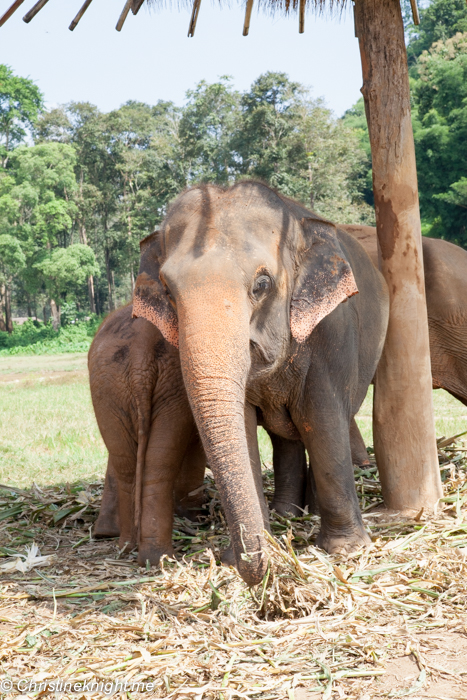
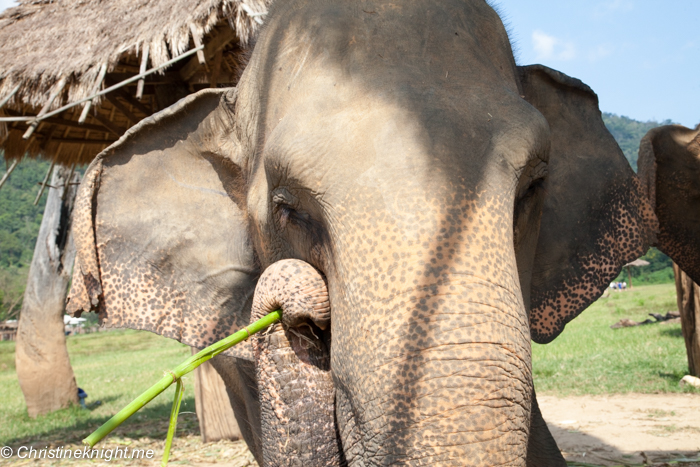
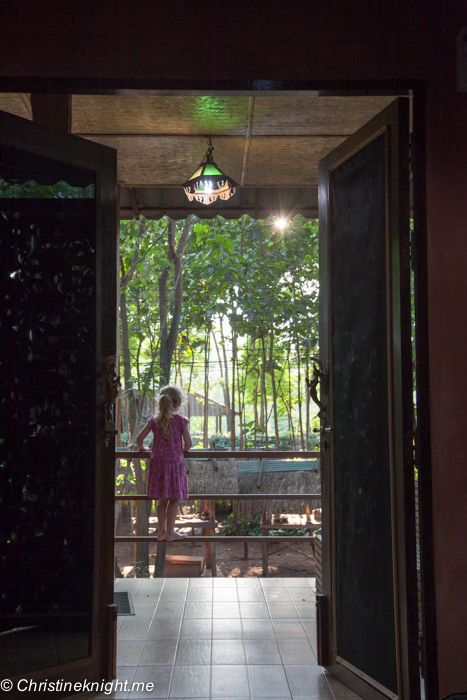
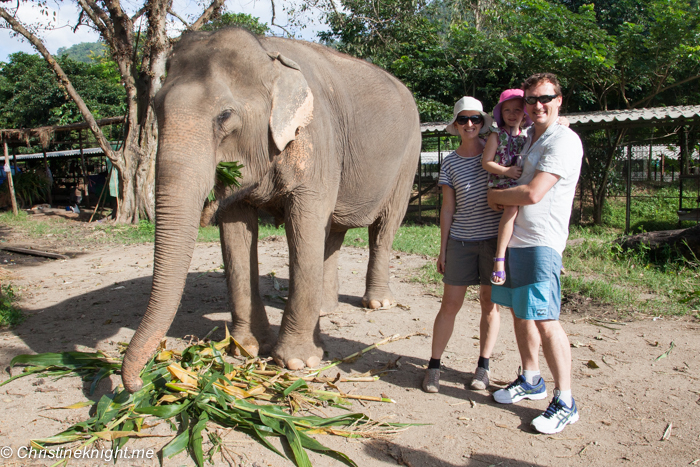
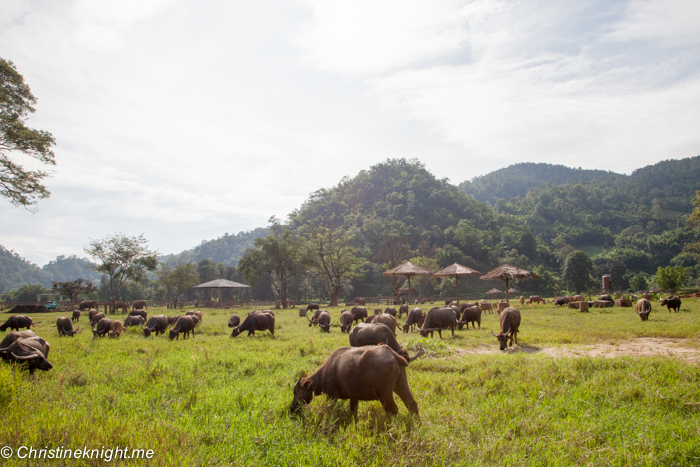
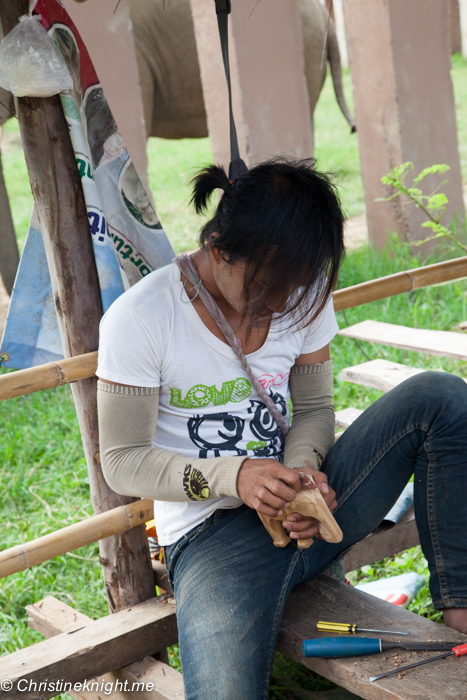
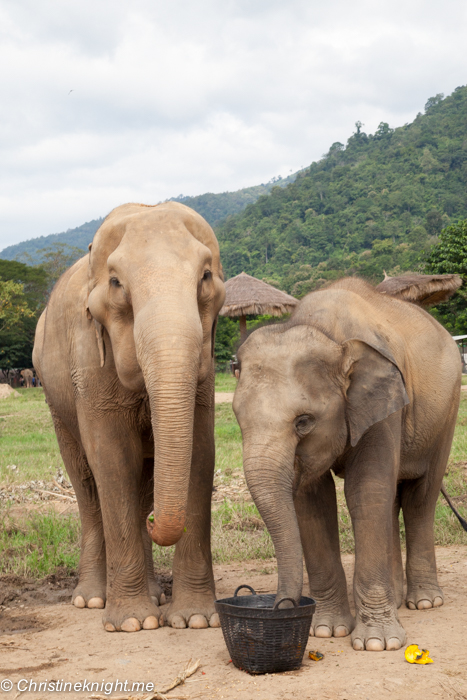
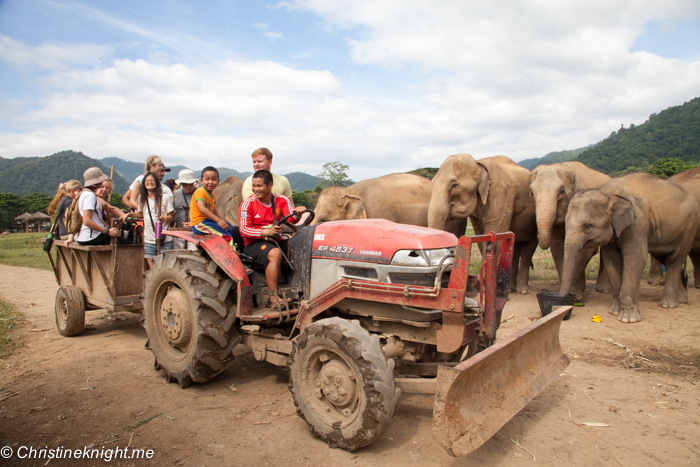
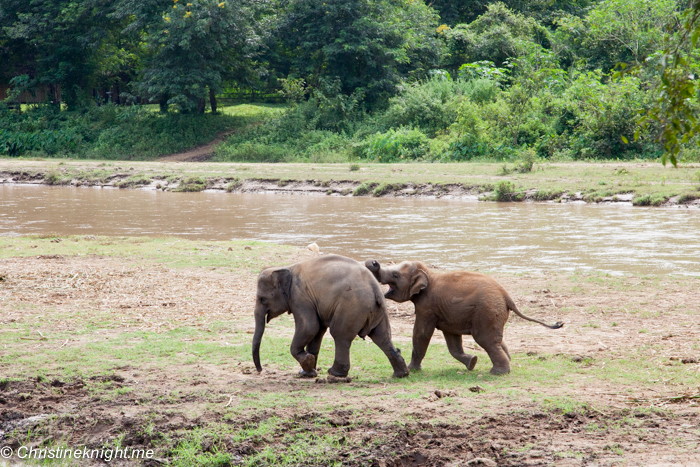


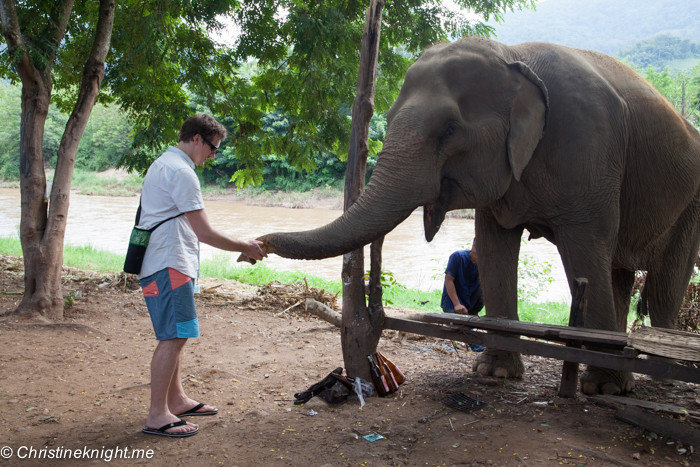
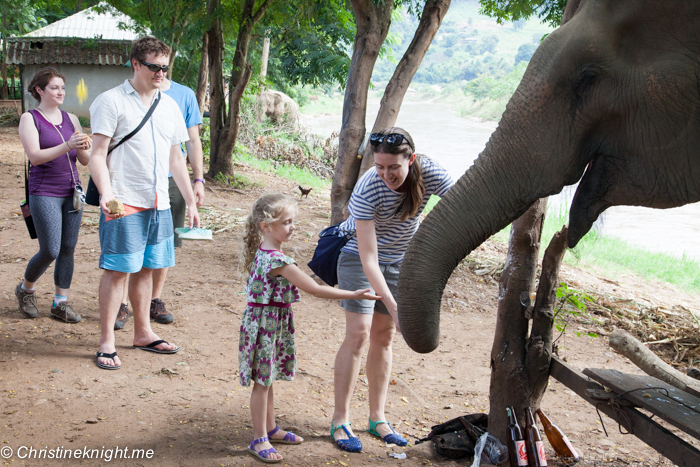
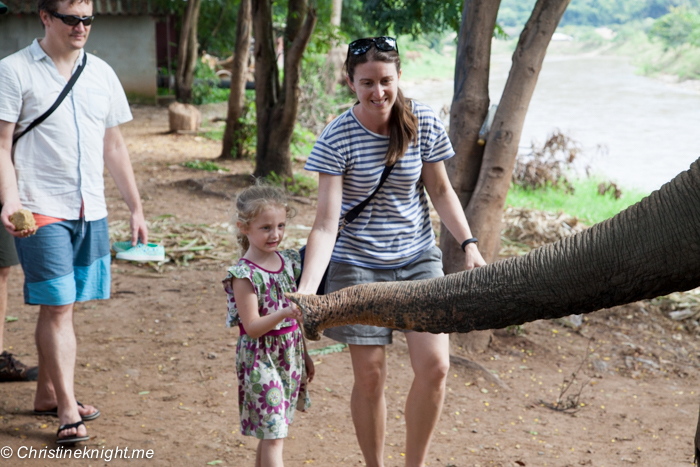
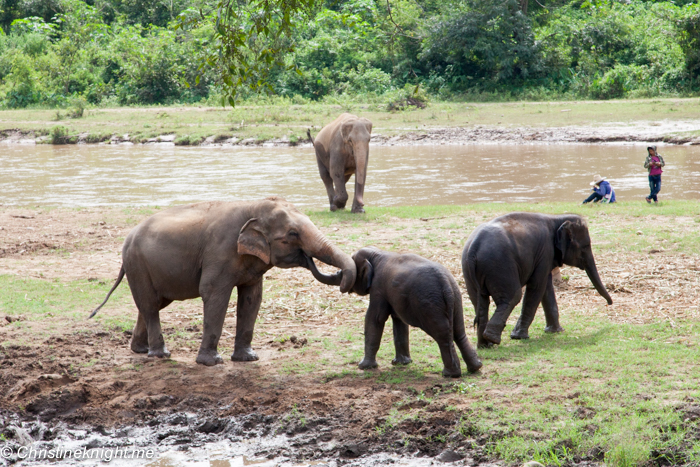
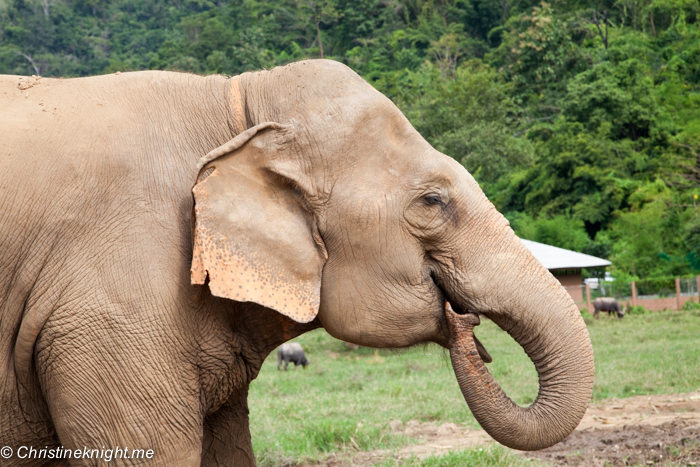
Elephant Nature Park Office
1 Ratmakka Road, Phra Sing,
Chiang Mai 50200, Thailand
elephantnaturepark.org
Read about must-visit temples in Chiang Mai.
Find Phuket accommodation.
Check out things to do in Phuket with kids.
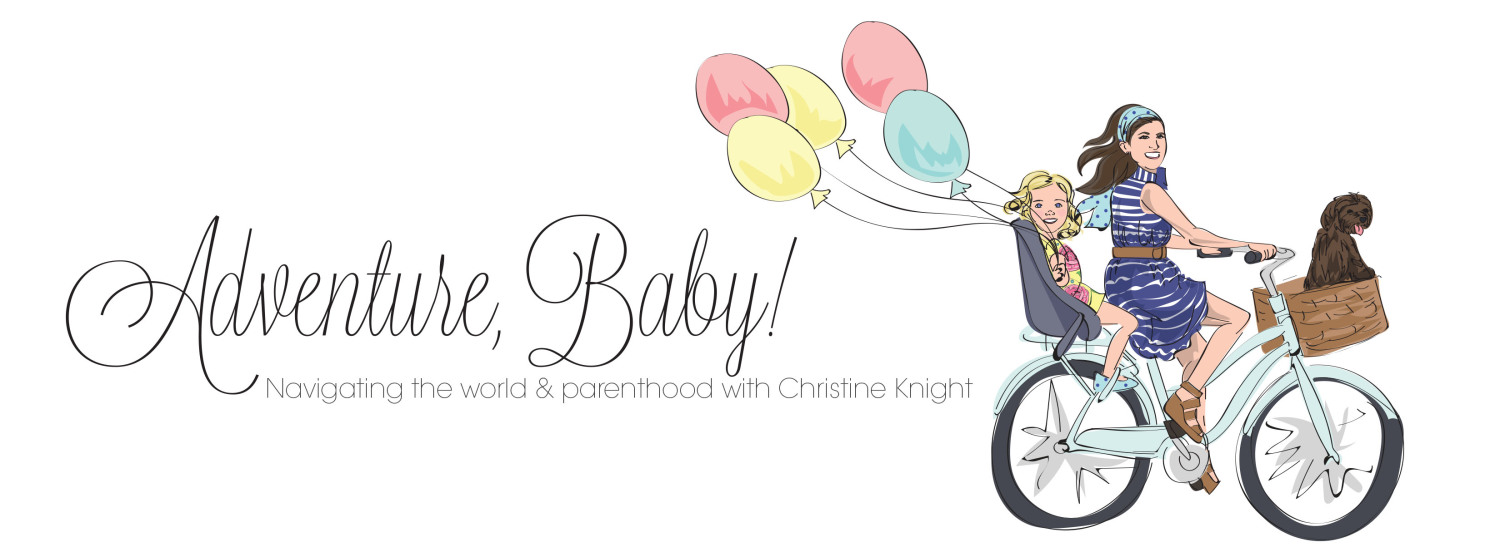
So important to get this message across. Can’t wait to show my junior elephant activist your post
<3 I hope he likes it.
The sanctuary sounds amazing, elephants are very special to us in our family. I am half Thai myself, and have always hated seeing elephants being so commonly mistreated. It’s heartwarming to see a movement gaining some momentum
Thanks so much Lauren. We’ve been spreading the word everywhere we can since we left. It’s crazy how little people know in general about these animals. Thanks to the ENP I feel better armed with knowledge to tell their stories.
Your photos are absolutely stunning! What an unforgettable experience!
My husband and I are pretty set on Sri Lanka for our honeymoon and would love to do some volunteer work at a sanctuary. Your list has some really good points to look out for. There’s actually a “sanctuary” in SL that’s under fire for chaining the elephants and doing other questionable things…
I also love the fact that the sanctuary only serves vegan food, which is totally in line with animal protection (and is so so delicious!! 🙂
Thanks so much Aryane Good luck with your Sri Lanka honeymoon and sanctuary – it can be so hard to tell which ones are legit.
I spend one day at the ENP this summer, because I had heard a lot of good things about it. And although the scenery and park are wonderful, I thought it was way to busy and touristy…..hundreds of people!!!….it felt like a money making machine..
Last year I had been to a different elephant park near Chiang Mai, and that one felt much more authentic.
I was very dissappointed in ENP. Maybe I will visit it another time in the enxt few years, not in summer though!, to give them a second chance.
x
Thanks for the comment Stephanie. There were definitely a lot of people but I felt like the cause was just and the money went to saving more elephants so I didn’t mind. I would be interested to hear what the other park you mentioned was like. I would love above all else to see these magnificent creatures in the wild.
I agree it would de amazing to see them in the wild! 🙂